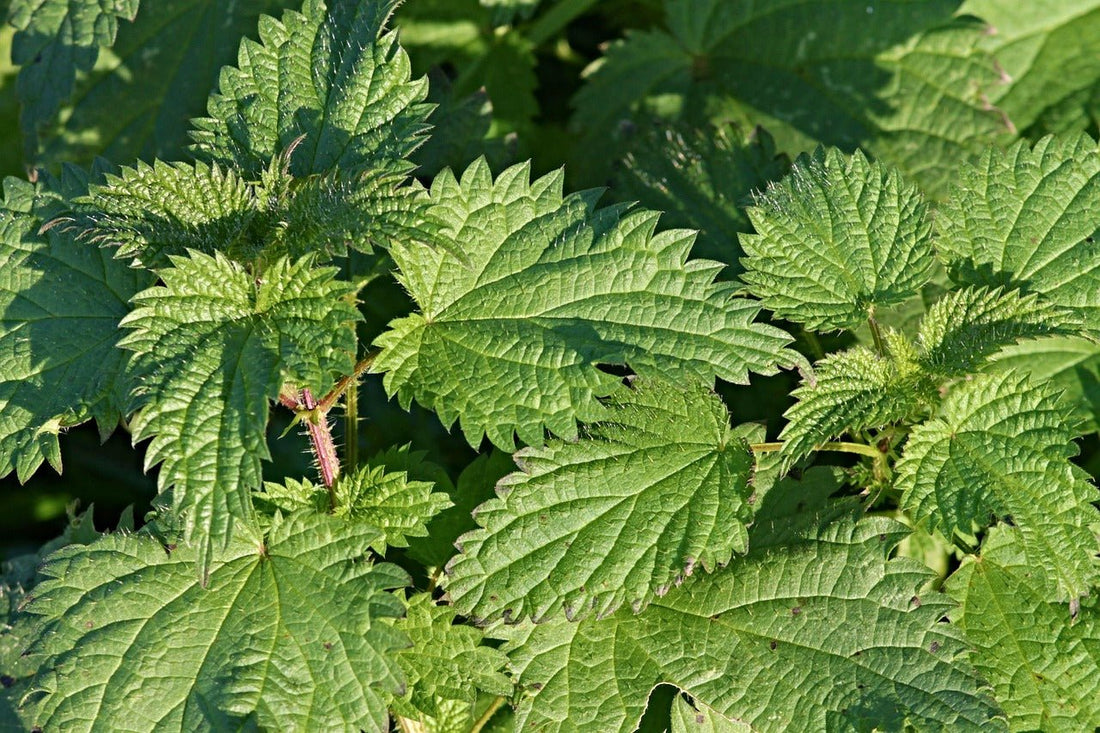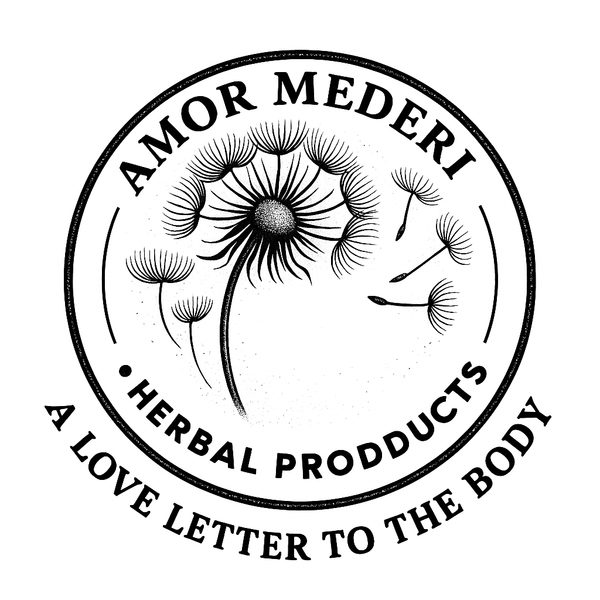
Stinging Nettle: The Fierce Green Guardian of Vitality.
Why I Love Nettle (And You Might Too)
If there’s one plant I could talk about for hours, it’s nettle. I absolutely love nettle. Not in a trendy “superfood” kind of way—but in the deep, reverent, awe-filled way you feel about something that has changed your life, or the lives of those you care for.
Because nettle isn’t just “good for you.” It’s one of the most nourishing, protective, and versatile plants I’ve ever worked with. It stings, yes. But behind that sting is a wealth of healing—physical, emotional, even spiritual. Let me tell you why I think this wild weed is one of nature’s most incredible gifts, and why it's often referred to as 'Mother's great green milk'.
A Sting and a Story: Nettle Through the Ages
Nettle (Urtica dioica) has been loved (and feared!) for centuries. The ancient Egyptians used it for back pain and arthritis. Roman soldiers rubbed it on their skin to warm their limbs in the cold. In traditional European medicine, it was used to support the blood, soothe joint discomfort, and flush out excess fluids. And across so many cultures, people simply ate it—as a spring tonic after the long winter, when bodies were weary and in need of deep nourishment.
That sting? It's not a flaw. It’s protection. Nettle teaches boundaries. It reminds us to approach with respect—and when we do, it gives generously.
What’s In Nettle (And Why Your Body Will Love It)
Here’s where things get wild: nutritionally, nettle is off the charts!
The leaf—which, once dried or cooked, is incredibly rich in nutrients:
Protein: Around 33–35g per 100g dried nettle. That’s huge. For a leafy plant, it’s nearly unmatched. Protein accounts for 30% of Nettles dry weight.
Fat: Only 3.6g—but full of essential fatty acids like omega‑3 (α‑linolenic) and omega‑6 (linoleic), which your brain and hormones love.
Carbs: Around 36g, plus about 8g of fibre for gut health.
Vitamins (per 100g dried nettle):
Vitamin A (carotenoids): 2010 μg — well over 250% of your daily needs.
Vitamin C: A whopping 333 mg—that’s nearly four times what’s in an orange.
Vitamin K₁: 1100 μg—hugely important for blood clotting and bone health.
Vitamin E: ~10 mg—for skin, fertility, and cell protection.
Plus B2 (riboflavin), folate, pantothenic acid, and trace B vitamins.
Minerals:
Calcium: 1690 mg (!)
Magnesium: 330 mg
Iron: 32 mg (and paired with vitamin C, so it absorbs well)
Potassium: 450 mg
Phosphorus, Silicon, Zinc, Copper, and Manganese round it out.
It’s basically a multivitamin in plant form—except alive, whole, and synergistic.
And beyond nutrients? Nettle’s got plant magic too:
Flavonoids (like quercetin and kaempferol)
Carotenoids (like lutein and β-carotene)
Phenolic acids (caffeic, ferulic, and more)
Tannins, plant sterols, chlorophyll, lignans, and even lectins in the root.
So What Can Nettle Actually Do For You?
This is where I get excited. Because modern research has confirmed what traditional medicine has known all along: nettle doesn’t just nourish you—it actively supports healing in so many systems of the body.
Here’s what nettle may support, based on both traditional use and scientific findings:
Inflammation & Joint Discomfort
Nettle is naturally anti-inflammatory. It works by calming NF‑κB pathways in the body (science-speak for: it helps reduce pro-inflammatory chemicals). People have used it for arthritis, muscle aches, and general inflammation.
Fluid Retention & Kidney Support
Nettle is a gentle diuretic—it helps your body let go of excess water and toxins. That’s why it’s often used for urinary tract support and swelling.
Energy, Blood & Iron
This is where nettle shines. It’s one of my go-to plants when someone is run down, tired, pale, or depleted. It’s rich in iron and vitamin C (the perfect combo for absorption), along with blood-building chlorophyll. Herbalists have long used it for iron-deficiency, fatigue, postpartum recovery, and rebuilding vitality.
Heart & Circulation
Its potassium, magnesium, and antioxidant content support healthy blood pressure and circulation. Some research even suggests it may help regulate blood lipids and vessel function.
Brain & Nerves
Nettle has been shown to have neuroprotective effects in studies—especially against oxidative stress. Traditionally, it’s been used to strengthen those who feel mentally foggy, frayed, or overextended.
Blood Sugar Balance
Another gem: nettle contains compounds that support healthy insulin secretion and glucose metabolism. It’s been studied for supporting blood sugar levels in type 2 diabetes.
Women’s Health
Nettle’s mineral content makes it a favourite for menstrual and postpartum health. It helps replenish iron, strengthen the womb, and it increases milk supply. I drank it when I was breastfeeding both of my children. Nettle can relieve unpleasant premenstrual symptoms such as cramping and bloating, as well as reduce blood flow. She also can ease the transition and act as a restorative for woman dancing with menopause, lowering the intensity of the hormonal shift in the body.
Allergies & Immune Balance
Nettle has a long history of helping with hay fever and seasonal allergies—especially when used regularly before allergy season. It contains compounds that calm histamine activity and modulate the immune response.
Skin, Hair & Nails
It’s packed with silica, zinc, vitamin A, and other skin-loving nutrients. You can drink it, or even use it in a rinse to strengthen hair and bring shine. In fact, I’ve seen nettle transform tired, brittle nails and dull skin when taken daily.
Prostate & Hormone Health
Nettle, in particular, is known for supporting prostate health and hormone modulation. Some studies suggest it helps reduce benign prostate enlargement symptoms and modulate sex hormone binding globulin (SHBG).
✨ Spirit of the Plant
Nettle doesn’t just feed the body. It strengthens the spirit.
This is a plant of fierce love. It teaches boundaries—literally. If you grab it without care, you’ll get stung. But if you come with presence and respect, it becomes one of the most giving allies around. Nettle is a plant for people who give too much and feel depleted. It restores. It protects. It says, “I’ve got you”—but also, “you need to protect your energy.”
I often recommend nettle to people who feel energetically drained, overwhelmed, or spread too thin. It nourishes the root chakra, strengthens the aura, and helps you stand in your own grounded power again.
How I Use It
Infusion (Tea): 1–2 teaspoons dried leaf per cup. Steep covered for 20–30 minutes—or if you really want to dance deeply with nettle steep overnight for a deep mineral brew. For this, I normally use 30 grams of dried Nettle in 1 litre of boiled water, and leave it overnight in the fridge, and drink the resulting brew throughout the day.
Food: Steam or cook the fresh young tops—like spinach, but with way more goodness.
Always cook or dry fresh nettle before using—this neutralises the sting!
If you’ve never tried nettle, I hope this opens the door. If you already love it like I do—well, I hope this deepened your love. 🌿
